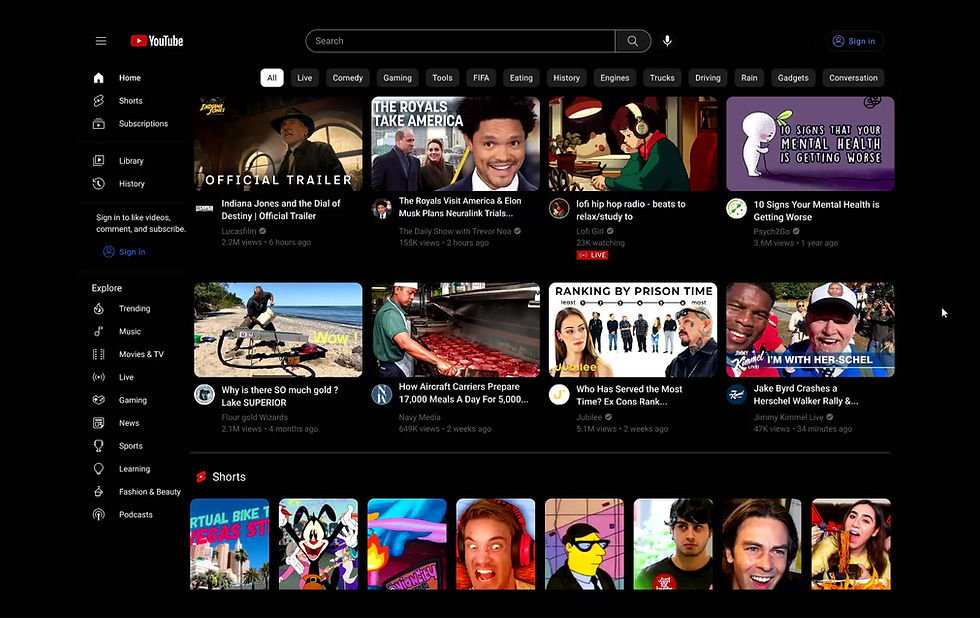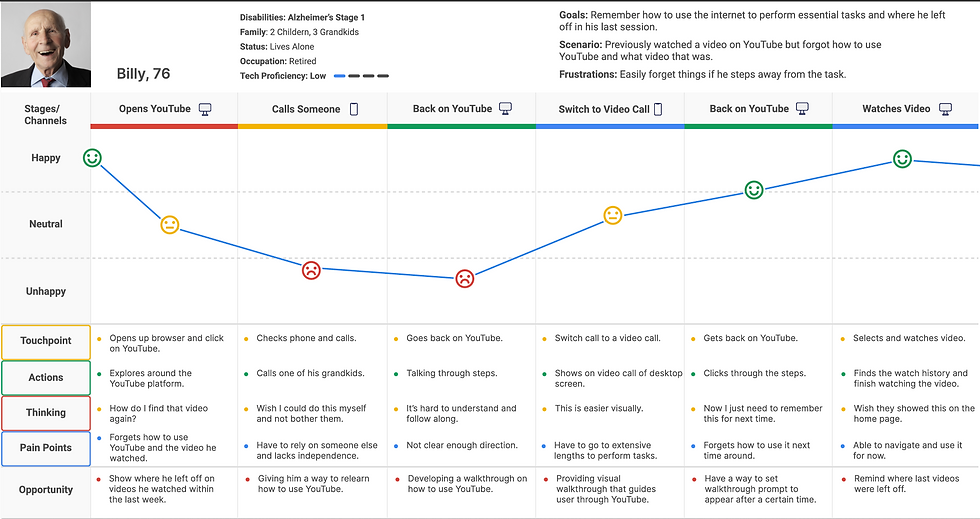

Role
UX/UI Designer
Team
1 Product Manager
2 Front-end Developers
2 UX/UI Designers
1 Data Analyst
Tools
Figma
Adobe Creative Suite
Canva
Google Sheets
Timeline
24 hours - Web
Product Design
Results
🥈 Runner-up out of 14 teams in a Google-sponsored hackathon, with stakeholders highlighting its strong user focus and accessible design.
🤝🏻 80% of test users found the navigation intuitive and accessible, completling tasks with out assistance.
🚀 If implemented, the solution could reach 10,000+ users within target demographic within 6 months.

Overview
As part of a Google-sponsored Industry Hackathon, our team was challenged to design a solution that empowers communities by improving access to information, education, and digital tools—ultimately increasing accessibility to essential services.
With only 24 hours to ideate, prototype, and present, we focused on creating an inclusive, user-centered solution that bridges gaps in digital literacy and resource accessibility.
Solution
We decided to focus on a solution that would help individuals with Alzheimer's feel a sense of empowerment and independence with regards to their access to online services. The design solution we developed was Google Kandula, a web dashboard aimed at providing those with Alzheimer's the ability to relearn daily interactions of their favourite websites through repeatable on screen prompts and the ability to track their last known progress on a website.
User Research and Empathy
Based on the quantitative research below, I was able to gain a better understanding of our target demographic, being users with Alzheimer's disease. We identified some of the potential pain points that they may experience when accessing information and resources through deep empathy. Some of our team members deeply resonated with this as they knew people in their lives that struggled with Alzheimer's and had difficulty remembering daily tasks.
Approximately 16 million caregivers provide unpaid care to individuals with Alzheimer's or other dementias, providing an estimated 18.6 billion hours of care valued at $244 billion.
About 1 in 9 people age 65 and older (11%) have Alzheimer's disease, and the prevalence of the disease doubles every 5 years after age 65.
Mentally stimulating activities, such as puzzles, memory exercises, and brain-training games, can help improve cognitive function and slow down the progression of the disease.
Existing Challenges
Through our analysis of negative user reviews of existing Google apps, we identified common obstacles that users encountered in terms of the apps' accessibility. By examining the words that were most indicative of negative feedback, we was able to determine the main challenges that users face.
1
Accessibility features are not user friendly and are buried in complex menus or require specific knowledge to activate.
2
Use of accessibility features results in crashes and lag due to compatibility issues, software bugs, or device limitations.
3
Accessibility features are hard to disable when not needed due to complicated menus, unclear instructions, or hidden settings.
User Challenges
With the time constraints for this project, we were unable to reach as many users as we would have liked, which pushed us to heavily rely on our research. This is something that we would like to revisit given the opportunity.
Through our research, we identified several key themes and challenges that individuals with Alzheimer's disease may experience.
1
Difficulty in recalling recent activities or events.
2
Repeating questions previously asked due to inability to retain information.
3
Experiencing longer completion time for daily tasks.
Meet Billy
Now the real question; who are we designing for?
Given the timeframe for this project, we developed a user persona based on our research that would establish a clear relationship between users with Alzheimer's disease and their inability to remember app functionality. With this consensus, we were able to guide our design process and ensure that the product had great potential for further exploration.

Billy Harrison
Billy Harrison, a former military veteran, has been diagnosed with stage one Alzheimer's disease. He has been experiencing mild memory loss and difficulty with everyday tasks. Despite his usual independence, he has had to rely on his children and grandchildren for assistance with internet use due to his condition.
Pain Points
-
Forgetting where he left off on incomplete tasks.
-
Remembering how to perform daily tasks.
-
Repeating previously completed tasks.
Needs/Goals
-
Visual queues on how to proceed with his tasks.
-
Clear descriptions of what functions do.
-
Ability to customize reminder frequency.
Behaviours
-
Uses the internet only when assistance is readily accessible.
-
Jots down notes by hand when learning how to perform activities.
-
Relies on older technology due to its familiarity.
Billy's Experience
With our user persona in mind, we developed an experience map to visually highlight the key points of Billy’s journey to achieve their goal.
What we discovered was that people with Alzheimer's disease retain information better when learning visually, which solidifies our original hypothesis.

User Journey
Next, we developed a user journey that would showcase how users would interact with the product. In this case, users would go through a virtual walkthrough that showcases the functionality of YouTube and gives the user an option to continue to YouTube or see where they previously left off.

Sketching the Experience
To begin the design process, we began developing rough sketches of how we wanted the screens of our prototype to look based on the user task flow.
Next, we refined the sketches and developed a set of solution sketches that we would use for the development of the lo-fidelity wireframes.
Wireframing
Taking our sketches, I developed a series of wireframes as the foundation for what would eventually become our final prototype.
For the purpose of this project, I created a minimal viable product (MVP) that would help validate any design assumptions during the early stages of product development.
Final Prototype
With numerous reiterations and refinements, we arrived at the final rendition of our prototype for this project.
Introducing Google Kandula, a revolutionary browser plugin that helps people with Alzheimer’s disease remember the functionality of a site they last visited and their previous interactions with it.









